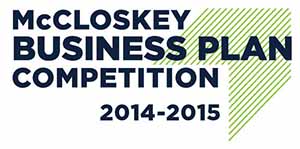New rule creates new learning opportunities for McCloskey Business Plan Competition
Published: October 8, 2014 / Author: Christine Cox

The McCloskey Business Plan Competition enters its 15th year with better learning opportunities for Notre Dame students than ever before.
The six-month competition, which awards $300,000 in cash and prizes annually, now requires alumni or faculty teams that advance past the first round of judging to invite at least one current Notre Dame student, either undergraduate or graduate, to lead the team through the business planning process for subsequent rounds. In the past, alumni and faculty teams were not required to include current students at any stage of competition.
The basic entry requirement for the first round remains unchanged: All members of the Notre Dame community—students, faculty and alumni—are eligible to form teams to enter the competition.
Karen Slaggert, associate director for the Gigot Center for Entrepreneurship, which sponsors the competition, says the change brings the focus of the competition back to where it belongs—on student learning.
“The purpose of the Gigot Center is education,” she says. “While the McCloskey Business Plan Competition is a great opportunity to win some serious cash and prizes, what we’re really all about is the opportunity to help students and alumni understand the process involved with starting a business, of how to move beyond the idea stage to get the idea to market. Participants indicate that the most valuable part of the competition is learning about the business planning process through mentorship and Gigot Center resources.”
Slaggert says key Gigot stakeholders and advisors agree that adding current students to the teams progressing to the second round was the right way to proceed. The Gigot Center will help pair such teams with capable students who will add value to the overall business planning.
“This change is especially significant for alumni, who may feel disconnected and far removed from the Gigot Center,” Slaggert says. “Adding student leaders will be a tremendous benefit because they are on campus and can attend workshops and lectures tailored for the competition,” Slaggert says. “Now someone representing each team will be here to take advantage of all the resources of our networks. It’s a win-win-win for everyone.”
Round 2 is the phase of competition where teams deeply explore the business model, including market research, receiving expert feedback and other processes to validate a business idea. “These processes are very important, and we ask that teams collaborate with current students and allow students to lead the team for the purposes of the competition.”
Slaggert stresses that any student, alumni or faculty member from any Notre Dame college or school is eligible. Forming well-rounded teams with complementary skills is invaluable.
John Henry MBA ’15 was part of a team of current students, alumni and professors in last year’s competition. South Bend Bricks reached the final round of the McCloskey Competition with its sustainable business idea that promotes a naturally insulating clay brick. “It was a great experience to work with our interdisciplinary team from Mendoza and the School of Architecture. We all complimented each other’s strengths,” Henry says. “Our concept was a building material, and within weeks I was talking to CEOs of manufacturing, architecture and construction firms. The entire process really opened my eyes to what people meant when they said ‘the Notre Dame network.’”
The McCloskey competition consists of four stages:
Round 1 (deadline Oct. 31, 2014)
Teams submit required documents along with a 50-100 word public summary for their new venture. The overview outlines the business concept, target market, competitive landscape and financial potential for the venture. The deadline is October 31.
Round 2 (deadline Feb. 20, 2015)
Teams, which must include a current Notre Dame student, develop a 10-page “transitional” business plan (with up to 5 pages of appendices) for the venture, including sales, pricing and production strategies, detailed financial projections and other relevant business details. Teams advancing to round 2 may request a mentor from the Irish Entrepreneurs Network or Notre Dame entrepreneurial community. The mentor provides feedback as the team develops the business model and writes the business plan.
Semifinals (April 16, 2015)
Teams are required to come to the Notre Dame campus to deliver oral presentations before a panel of judges.
Competition Finals (April 17, 2015)
Finalists are identified and announced at the end of the semifinalist presentations. Judging of finalists takes place on April 17.
Last year’s McCloskey Business Plan Competition drew 149 teams to the first round, and 111 teams were invited to advance to the second round. Twelve semifinalists were invited to present to a panel of judges on April 10. The judges narrowed the field to the six teams for the final round of live presentations.




